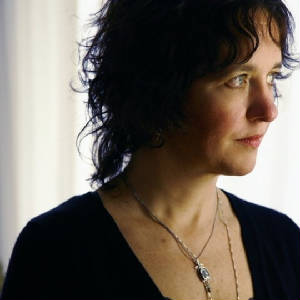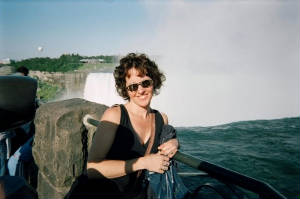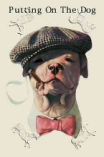|

Laura
Kasischke teaches at the University of Michigan in the
MFA program and Residential College. She has published eight books of poetry and eight novels, the most recent being
Space, In Chains and The Raising (see review in this issue). Kasischke was recently named the winner of the first Rilke Poetry Prize, awarded by The University
of North Texas Creative Writing Program in order to recognize “exceptional artistry and vision written by a mid-career
poet.” She lives with her husband and son in Chelsea, Michigan.
Kim
Grabowski for The Smoking Poet: I’d like to start out by discussing
your new book of poetry, Space, In Chains. It
seems even more associative than your previous books of poetry, as if you inhabit your imagination even more deeply. Can you
talk a little bit about the process of writing this book compared to the others?
Laura
Kasischke: A few years ago I read an interview with the
fiction writer Dan Chaon in which he was asked about his fiction-writing process. He
said that he starts out by writing a scene, or maybe a character sketch, puts it in a folder, and puts it away. Then at some point he writes another, and then maybe another, and puts those in the folder, closes the
drawer, and hopes that they will mate. I loved that. I couldn’t have possibly articulated it, but that was a little like what I was doing at that point
myself, but the interview freed me up to do it full-tilt.
I started writing ‘bits.’
Collecting images, etc., closing the notebook, in my case, and hoping they would mate. Sometimes they did! And I found that somehow I was able to say things I’d be working toward so much better (in my own
humble opinion) than whenever I’d tried to go at it straight on.
In the past I’d made association
my process, but if you sit down to free associate, there’s only so far you’ll get at any one time from the place
you started, I find. You’re writing in one breath, under the same ceiling, in the same landscape. Writing a poem over the course of weeks or months and putting its pieces together was really exciting for
me. Now, I’m doing something else, though.
I guess you use the tools you have at the time, and maybe use them up?
TSP:
You have unique instincts when it comes to line breaks. They feel intuitive and natural. Though you preserve your
unique style in this new book, the way your poems look on the page seems to be evolving. How
do you make formal decisions, and how were they different for this book from your previous books?
Laura:
I try to think about the poem on the page as a kind of score to the reading
of the poem. I never think visually. It’s
usually entirely about the emphasis on a word at the end of the line, or the emphasis on a line itself, as a single stanza
or at the beginning or end of the stanza. I just get a poem on the page, and
then I read it over and over and over, changing the breaks—line breaks as well as stanza breaks. Well, usually I do that.
TSP:
This book makes some interesting, unexpected imaginative leaps, such as “For
an hour in 1981 I was a girl with drunken hair in a swaying tower. // For a month or two in my twenties I paddled a boat made
of lead down a river of blood with my hands.”
The series of “Riddle”
poems are also compelling in the same way. Yet, somehow, you always manage to invite us into an entirely new world. How concerned are you with making sure you’re taking your reader with you when you leap?
Laura:
Well, it’s not very generous of me, but I don’t think about
the reader that much! I know that’s exactly what I shouldn’t reveal, but the associations just seem right to me,
or they don’t, and although I’m obviously out in the world trying to publish poems a lot, so why is it that every
time I write something, even a novel, I never think it will be published, and never think anyone else will ever need to read
it? It’s not humility! I guess
it’s a kind of distancing or denial I need in order to write?
TSP:
What choices do you feel you make in revision that aren’t on your
mind during the initial writing process?
Laura:
Honestly, there aren’t any—except typos and grammar and
spelling. I’m thinking about all the same things when I’m writing that I worry about when I revise—which
is sound, energy, vividness, that sort of thing.
TSP:
Your name appears on astounding works of both poetry and fiction. How do you grapple with the two different worlds?
Do you have to go into each one with a different mind set? Are you partial
to one?
Laura:
Writing fiction is totally different from poetry for me. It’s
a long haul. Much more work-a-day. I couldn’t write a novel in some high
state of inspiration every day for three years or anything like that.
I like to think that now and then
I’m in a high state of inspiration, but often it’s a matter of discipline, not, you know, the Muse, when it comes
to writing a novel. With poetry, there’s no discipline involved, but I
have to really have the time, energy, inspiration to sit down and work on a poem for the first time.
That only happens every so often.
A novel would never get written that way. I can work on my novel when I’m
exhausted and my son’s practicing violin in the next room and the cat’s on my lap, etc. But I pretty much need to have the doors locked and no time constraints if I’m working on the first
draft of a novel. And that’s hardly ever an option. Which is fine. The
world only needs so many poems of mine. But that’s also why it’s
great to write novels (why doesn’t everyone??)—I’ve always got this fun project going, and something to
think about when I’m in a boring meeting or waiting in a line.
TSP:
I have a theory that your ability to free your imagination in poetry
could be a result of your analytical mind’s preoccupation with fiction.
How do you feel the genres compliment each other?
Laura:
Well, I started writing poetry much earlier than fiction, and I’ve
never truly considered myself a fiction writer, even though I spend a lot of time writing fiction. To me, they’re just
completely different. But I like your theory.
TSP:
How is success as a novelist different from success as a poet? Do you feel it has had any affect on your work?
Laura:
Uh. Success as a poet? It’s pretty much the same as total obscurity
… Two free copies of the journal your poem was published in. And some blank looks from friends and family after they
read your poem.
But, of course, the writing of poetry
is its own reward, because poetry’s so ancient and sacred and strange. And, well, with fiction you get money. I mean,
not tons of money (or some fiction writers do …), but some money. It’s affected my work in that I feel the urge
to write fiction when I’m broke. But, actually, I’d still write fiction without getting paid (and have done so,
I’d point out) I THINK. But I’d write poetry even if it COST me a
lot of money (which it has, I’d point out).
TSP:
How is the writing community in Michigan different from that of a major
literary center such as New York City or Chicago?
Laura:
I have no idea! I’ve been in Michigan almost my entire life. I
grumble a lot about the weather, but this is home, totally. And except for teaching
and going to Music Boosters meetings, I really like to be home. Alone. So I suppose being in NYC or Chicago would be the same as being here, since I wouldn’t be seeing
other human beings much anyway.

TSP:
What advice do you have for young writers?
Laura:
If you feel completely called to do this, do it, and assume that you
either are divinely gifted already, or will one day be divinely gifted. Assume that, if you aren’t publishing or winning
awards, it’s the fault of the editors and judges.
Try to live with the possibility
that you will die without ever having published anything or won anything, but that after your death your work will make you
immortal.
It’s totally grandiose, of
course, bordering on delusional, but there’s no other way to pursue this and not be discouraged or (worse?) to start
pandering to the public taste in a way that will make you a poor poet.
The goal is to love writing poetry,
to stay passionate about it, to have it enhance your life—and it can and will if you stay focused on it as your personal
salvation, not something you’re doing to make other people notice you, etc.
In the meantime, do all kinds of
interesting things that will make you a better poet: love, read, think, work
hard at something in addition to poetry-writing, find some idiosyncratic interests.
If you do this, with poetry at the center of your life whether anyone knows it but you or not, you’ll have all
the ingredients for a great life, as long as you also find some way to pay the bills that isn’t too awful and leaves
you at least an hour or so a day to read and write.
TSP:
Can you talk at all about any current projects or artistic obsessions?
Laura:
I’m writing short poems all of a sudden. It’s so hard! You’re so naked in a short poem. It’s why I’ve avoided them all my life.
But, suddenly, that’s all I want to read and write. It’s creepy.
TSP:
Thank you for taking the time to talk with us! Your work is always asking hard questions of us, as readers. We
owe you a debt of gratitude for allowing us to explore our own imaginations, as you explore yours.
|

